- Home
- Fergus Hume
The Crowned Skull Page 17
The Crowned Skull Read online
Page 17
‘Various things. First, to make matters clear, I’ll tell you the story of the Death’s Head. I think that will supply the motive for the murder of Bowring by Trevick.’
‘You told me of the three warnings.’
‘In Africa, but I did not explain fully. The fact is, I was not quite sure at the time of the true story. But I learned it, and came back to tell it to Trevick—with the Death’s Head,’ ended Polwin, slowly and pointedly.
Chapter XVI The Letter
Mrs. Krent placed her fat hands on her fat knees and stared at her wicked little husband. That gentleman lighted a fresh cigar and lounged back in his chair sipping a glass of port with an appreciative air.
‘Well, Maria?’ he murmured.
‘You—you had the Death’s Head?’ she stammered; ‘you—you placed it in the tent at the fete?’
‘Quite so, Maria, and took it away again. I placed it there on the chance—we must always allow for chance—that Bowring would have his fortune told. He did, and saw it, so he must have known that the end was not far off.’
‘Samuel, do you mean to say that Miss Warry knows who killed—’
‘I believe she does,’ interrupted the steward quietly, ‘and on that knowledge based her prophecy, which every fool believed. As to the Death’s Head, I’ll tell you why it frightened Bowring. He was a superstitious ass.’
‘No,’ said Mrs. Krent, who looked frightened herself, and cast a shivering glance round the comfortable room, ‘Bowring didn’t believe in ghosts.’
‘He believed in other things, such as sudden death at the hands of an enemy—’
‘Sir Hannibal?’
‘Not in this instance—a Zulu witch-doctor.’
‘Oh, Morgan said—’
‘He mentioned a witch-doctor tonight in his mumblings,’ finished Polwin pleasantly, ‘so I remember. The witch-doctor saw him in the Transvaal, that time Bowring took the boy with him. Morgan has not been the same since, as he got his life frightened out of him.’
‘What a shame—the poor, mad boy.’
‘Not mad enough to prevent him marrying your daughter,’ chuckled Polwin. ‘But, enough! Maria, you are prolix, and the night is getting towards morning, also the wine is finished and the fire is going out. Listen, and hold your tongue about what I’m telling you until such time as I give you leave to speak.’
Mrs. Krent glanced at the clock, which pointed to twelve, and nodded in an anxious manner. Polwin tipped off the ash of his cigar with his little finger and began a rather gruesome story.
‘In the Transvaal,’ said he—‘I won’t for obvious reasons mention the exact place—Sir Hannibal had the misfortune to murder a Zulu.’
‘No, I don’t believe it,’ gasped Mrs. Krent, pushing back her chair.
‘Maria, I’ll screw your hand again,’ said Polwin with displeasure, then, when she hastily hid her sore hand again in her bosom, he went on calmly: ‘This Zulu had a diamond, which Sir Hannibal, and I may say, Bowring, wanted. He refused to part with it, and while chaffering in the wilds, beyond sight of the Transvaal police—you understand, Maria—Sir Hannibal shot him and took the diamond.’
‘No,’ said Mrs. Krent, keeping a wary eye on her husband in case he should torture her again, ‘I don’t believe that Sir Hannibal is a thief and a murderer.’
‘He is a thief, because he stole the Zulu’s diamond,’ said Polwin calmly, ‘and doubly a murderer since he killed the Zulu and Bowring. No one knew the truth save Bowring, and Sir Hannibal feared him.’
‘Oh, and you say that Sir Hannibal killed Bowring for that reason?’
‘Yes,’ assented Polwin; ‘I believe that Bowring grew weary of Trevick’s threats about the forged bills, and said that he would tell of the murder of the Zulu. Then, to save himself, Trevick killed him.’
‘As though anyone would care about the death of a nigger,’ said Mrs. Krent contemptuously; ‘I have been in Africa, Samuel.’
‘Oh, but this Zulu was a young fellow of importance, the son of a famous witch-doctor whom the Boers were trying to conciliate. He made a lot of trouble over his son’s death, and if Trevick had been caught he would have suffered imprisonment, if not death. Yes, even now, long ago as it is; for the witch-doctor took his tribe away and gave the Boers a lot of trouble. Only the punishment of the witch-doctor’s son’s assassin will make that tribe amenable to British rule now that we have taken over the Transvaal. So, you see, Maria, that Sir Hannibal Trevick, Baronet, had every reason to fear lest Bowring should go to the Foreign Office and tell what he knew. The disaffected tribe is an important one, and the Government would do much to get it quiet, even by hanging the murderer of the man whose skull frightened Bowring so much.’
‘His skull!’ gasped Mrs. Krent, terrified; ‘is that scarlet skull the dead man’s?’
‘It is. It must be some dead man’s, you know, Maria.’
‘But why should it frighten Mr. Bowring?’
‘I’m coming to that, if you hold your confounded tongue. It seems, as I afterwards heard the story and before I learned the exact truth, that the witch-doctor—Moolu, they called him—thought that Bowring had killed his son and stolen the diamond. He could not bring the crime home to him, but he did witchcraft over the business.’
‘What kind of witchcraft?’ asked Mrs. Krent, fearfully, for she was superstitious in spite of her gibe at Bowring.
‘Suggestion,’ snapped the little man. ‘He cut off the boy’s head, boiled away the flesh, coloured the skull scarlet and bound it round with a broad silver crown. Then he showed it to Bowring and said that when he, Bowring, that is, saw it again he would be near death.’
‘Why didn’t he kill Bowring at once?’
‘He wanted to torture him. In vain Bowring protested his innocence. He could not give away Trevick, you know, because of the forged bills. But Moolu didn’t believe Bowring’s protestations. He wanted to torture him with suspense and gloat over his sufferings. And he did torture him. Once in the Transvaal, Bowring found the skull in his tent, and afterwards was nearly speared. Then, again, in Cape Town he found it in his room, and he was knifed at night, but not badly enough to kill him. Moolu had told Bowring that when he saw the skull three times he would meet with his death. You may imagine, Maria, that Bowring had a very bad time, seeing that twice he had met with a narrow escape from death, and knew that the third appearance of the skull would be fatal. However,’ added Polwin, with a yawn, ‘he need not have been so frightened, for when Bowring went to England Moolu died, and there was no one to carry on the vendetta. But Bowring did not know that, and feared the third appearance of the skull. Suggestion, you see, Maria?—merely suggestion.’
‘And you brought the scarlet skull to England. Why?’
‘I thought it might be useful, as I knew how Bowring dreaded it. I used it in the tent, as I told you, but upon my soul Maria,’ the little man rose and looked serious, ‘knowing that Moolu was dead, I never thought that any harm would come of the business. I merely placed it in the tent to frighten Bowring. But he was killed, as you know. I believe that the talk of the skull being in the tent put the idea of murder in Trevick’s head. But I can’t prove anything. However, that is the story. Later we’ll tell it to Miss Trevick, and get evidence to prove Sir Hannibal’s guilt. Then she’ll hand over ten thousand pounds a year to me, and I vanish out of your life.’
‘I wish you were dead with all my heart,’ muttered Mrs. Krent, rising.
Polwin smiled blandly, and gave her a swinging slap on the face.
‘And now, my dear,’ he said, just as though he had kissed her, ‘I’ll take my way back to St. Ewalds.’
‘I wonder you’re not frightened to walk back in the dark along that lonely road seeing how wicked you are,’ whimpered Mrs. Krent, patting her cheek, which was scarlet.
The little villain laughed jeeringly, and walked alertly to the door, followed by his ponderous wife. When she opened the hall door to let him out he paused, and assume a meek, depressed air, worth
y of a great actor; even his face seemed to change into the semblance of a sheep. He was in one second in all respects the meek Josiah Polwin who had faced Oswald Forde.
‘This is the man as he is known in St. Ewalds,’ said he in a soft little voice, ‘when you see him, my dear Mrs. Krent, you need not recognise him. If you do,’ he straightened himself, and his mean face grew black and devilish, ‘you’ll get something like this to think about,’ and before the terrified woman could draw back he pinched the fleshy part of her arm so severely that she uttered a yell. The next moment damp darkness swallowed up the meek steward, still smiling blandly.
‘Oh,’ moaned Mrs. Krent, as she dragged herself up to bed, ‘why haven’t I the strength to squeeze the life out of that little beast?’
She might well ask this, for it did seem extraordinary that so large and determined a woman should submit to a mean, cruel dwarf. If Mrs. Krent had read about Quilp, she might have seen that Polwin’s character had been anticipated in fiction.
‘Has he gone, mother?’ asked Jenny, who was waiting at the head of the stairs, having heard the cry of her parent and the clang of the door.
‘Yes,’ said Mrs. Krent, sitting down and beginning to cry. ‘Jenny, my girl, I fear there are sad days in store for us.’
‘Surely not, mother, and you such a good woman.’
‘Ah, that I am!’ moaned Mrs. Krent, rocking herself to and fro; ‘if I were only wicked I would have killed that man long ago. Why did he come into my life again?’
‘Get rid of him, mother.’
‘Jenny, my dear, I can’t, you don’t know what a demon he is. I’ll wait, and in time he’ll go.’
‘When we get the money, mother, let us go away and hide.’
Mrs. Krent nodded, and kissed the poor, pretty face which bent over her.
‘What a comfort you are, deary. Yes, we’ll go to the ends of the earth. Samuel will never find us again. Never! never! Where’s Morgan?’
‘I sent him to bed,’ said Jenny; ‘wait one moment, mother. I’ll see if he is all right and come back and undress you.’
Mrs. Krent assented with a weary sigh, and Jenny glided away, looking frail and delicate in her flowing dressing-gown of white. She came back quickly and rather alarmed.
‘Morgan is not in his room.’
Mrs. Krent started to her feet and became all at once the active, managing woman she truly was when away from the sinister eyes of the man who dominated her so entirely.
‘Not in his room?’
Just as the words left her lips the bolts of the hall door fell, and it was opened. Snatching the lamp from Jenny, Mrs. Krent ran down the stairs and found the wind and rain streaming and blowing into the hall. There was not a sign of Morgan, yet she guessed that the idiot had slipped down to follow Polwin. His cap and coat were in the hall, so he must have run into the storm without any protection.
‘Mother! mother!’ gasped the little wife suddenly descending the stairs, ‘rouse the servants. We must hunt for Morgan.’
Mrs. Krent shut the hall door with a bang, and put up the bolts.
‘My girl, we can do nothing. Morgan has gone out like this before, and we have never been able to find him; you remember?’
‘Yes. He always comes back again in the morning. But he has not run out for a long, long time; don’t you think—’
‘We can do nothing,’ interrupted Mrs. Krent harshly; ‘let us go to bed. The boy will return again in the morning.’
This was all that could be done, as Morgan frequently, when the wandering fit took him, escaped on to the moors and returned wet, footsore and weary in the red dawn. But on this occasion Mrs. Krent doubted if he had taken to the moors. Rather did she think he was following Polwin along the lonely, dark road which led to St. Ewalds. And, remembering the man’s jeering remark when he had left, she shuddered to think that he might meet his death at the hands of the half insane man. But had she reason to believe that Morgan would kill the steward? Rather did he seem to be afraid of him. Therefore, utterly helpless, she went to bed, but lay awake for a long time picturing a gloomy road, and one man creeping stealthily after another one with murder in his heart.
She might or might not have been relieved had she known next morning that Mr. Josiah Polwin was eating a very good breakfast in the kitchen of the Dower House. He had arrived there without any mishap, and had gone to his own cottage in the garden without being seen. Now he was meek and timid, making an excellent meal, never thinking that Morgan Bowring had been following him on the previous night. And even had he known, Mr. Polwin would have been quite certain that no harm would have come of the meeting on the dark and lonely road. Polwin knew how to manage the idiot better than Mrs. Krent dreamed of.
But if Polwin was ignorant that Morgan was at large, Dericka was not. She came down to the breakfast-room in advance of Miss Lavinia, and after examining the letters to see if by any chance there was one from her absent father, went to look out of the window. To her surprise she saw a man asleep on the terrace, and opening the window—it was a French window—she stepped out and touched him with her foot.
The man sprang up with a weak cry, and she found herself facing Morgan, who looked more uncanny than ever in the clean morning light.
‘What are you doing here?’ asked Dericka sharply, but recoiling.
‘I came—I came—’ stammered the idiot, quivering from head to foot, ‘to see you.’
‘To see me?’ Dericka stepped back into the room as the look in his eyes was not pleasant; ‘what do you mean? No! Stop where you are,’ for he showed a desire to enter, and she feared to allow him inside.
‘I am cold,’ he grumbled, rubbing his hands together; ‘I came—I came—I came—’ he went on, hesitating, then his brain seemed to clear, and a more intelligent look came into his wondering, shifting eyes. ‘It’s about your father.’
‘What do you know of my father?’ asked Dericka sharply.
Morgan uttered a cry. ‘Don’t be angry with me,’ he stammered; ‘don’t hit me, pretty lady.’
‘I’m not going to hit you,’ said Dericka, in a softer tone, but keeping her eyes on his vacant face; ‘tell me about my father.’
‘I’m hungry,’ announced the idiot, his eyes on the breakfast table behind her, ‘and thirsty.’
Miss Trevick looked at him for a moment, then the lean looks of him and his timid glances softened her heart. She went and brought him a steaming cup of coffee and a crust of bread.
Morgan grabbed these eagerly and sat down to eat them. Dericka kept well within the room, ready to shut the window if he showed signs of violence. She was not exactly afraid, but she judged it best to be wary when dealing with such a creature.
‘I like you—I love you,’ mumbled Morgan, looking at her with the affectionate glances of a dog as he drank his coffee and ate the bread; ‘you’re much nicer than Jenny.’
‘Nonsense,’ said Dericka, humouring him; ‘she is your wife.’
‘I would rather have you. My father said that I was to marry you—yes, he did; but my father is dead. I didn’t like my father, you know,’ he went on confidentially, ‘he hit me very often. Jenny doesn’t hit me, but Mother Krent does. I’d like to slap her.’
‘Come, come. What are you doing here?’ said Dericka sharply.
‘Now you’re angry,’ whimpered the poor creature; ‘I don’t want to make you angry. See!’ He stooped and kissed Dericka’s foot, which was protruding from the window.
She withdrew it sharply. ‘Morgan, you must go home,’ she said coaxingly for she did not wish him to be here when Miss Lavinia came down.
The man rose and wiped his mouth.
‘I’m going,’ he announced; ‘I’m very glad you gave me food. I like you, but I don’t like your father. He killed mine, you know.’
‘How dare you say that?’ flashed out Dericka, forgetting that she was talking to an irresponsible person.
‘Mr. Polwin says so—yes, Mr. Polwin—he showed me the skull; you know—the s
carlet skull. Oooh!’—Morgan’s mouth widened—‘how horrible it is: all blood. One, twice, and the third time death! Ooooh! I am so afraid. Tell Jenny I want her,’ he cried piteously; ‘no one understands me but Jenny-wenny-penny.’
Miss Trevick looked at him with a blank face. She could not understand how the idiot came to be speaking of Polwin and the skull. Then it flashed into her mind that the steward had been to Africa and might know something of the Death’s Head.
She was about to ask Morgan a question, when he suddenly straightened himself and spoke in quite a matter-of-fact tone:
‘I ran away last night,’ he said, pulling a dirty envelope out of his pocket. ‘I was on the road, and then I climbed the moors. The old witch let me lie down, and Anak—you know Anak, he is big, isn’t he?’

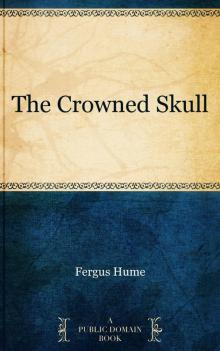 The Crowned Skull
The Crowned Skull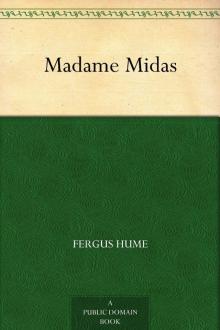 Madame Midas
Madame Midas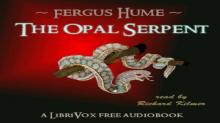 The Opal Serpent
The Opal Serpent The Solitary Farm
The Solitary Farm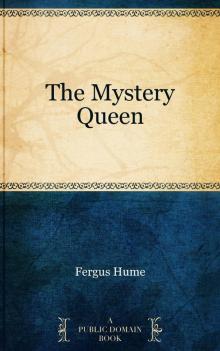 The Mystery Queen
The Mystery Queen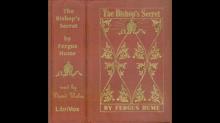 The Bishop's Secret
The Bishop's Secret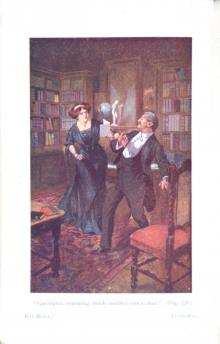 Red Money
Red Money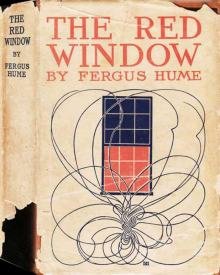 The Red Window
The Red Window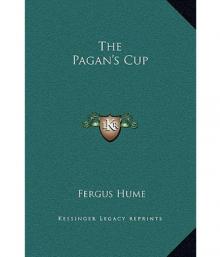 The Pagan's Cup
The Pagan's Cup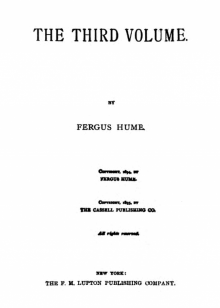 The Third Volume
The Third Volume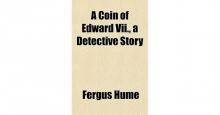 A Coin of Edward VII: A Detective Story
A Coin of Edward VII: A Detective Story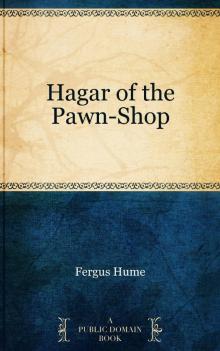 Hagar of the Pawn-Shop
Hagar of the Pawn-Shop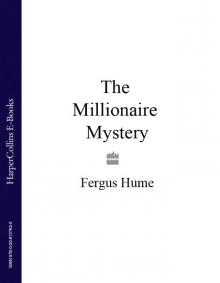 The Millionaire Mystery
The Millionaire Mystery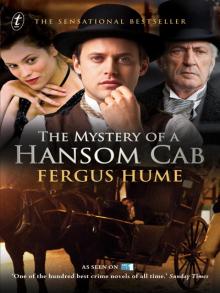 The Mystery of a Hansom Cab
The Mystery of a Hansom Cab